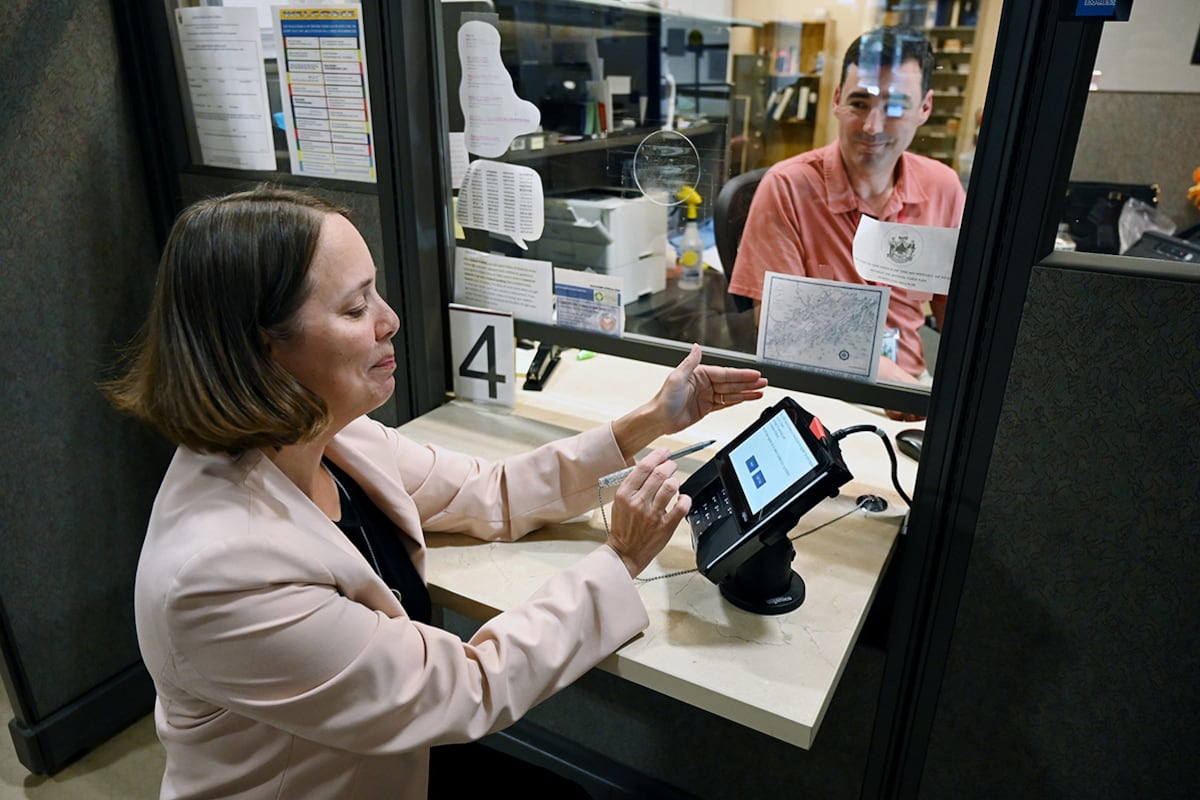Votebeat is a nonprofit news organization reporting on voting access and election administration across the U.S. A version of this post was originally distributed in Votebeat’s free weekly newsletter. Sign up to get it delivered to your inbox every Saturday.
Welcome to 2024! It is already quite spicy. I hope you are all well-rested.
Since we last delivered you an election news roundup, a lot has happened. Here are those things, in brief, and how I’m thinking about them.
First up:
Wisconsin Redistricting
The Wisconsin Supreme Court has ruled that the state’s heavily gerrymandered maps are unconstitutional and must be redrawn. It could result in earth-shaking consequences for the makeup of the Legislature in the particularly influential swing state. The decision hinged on new and controversial liberal justice Janet Protasiewicz joining the court, who’d rejected calls to recuse herself from the case after she was elected.
The Republican lawmakers who created the maps say they’ll take the case to the Supreme Court.
In related news, Wisconsin will officially be the next state in Votebeat’s coverage area. We’re currently searching for a reporter — interested journalists can apply here — and plan to have coverage of this and other key election issues in this highly contentious state.
This leads nicely to the next thing on this list: Michigan.
So much is happening there!
First, the state is also facing a pretty consequential court decision on redistricting. The day before the Wisconsin Supreme Court issued its ruling, a panel of three federal judges in Michigan ruled that 13 Detroit-area seats in the state Legislature must be redrawn because they were illegally based on race. “The record here shows overwhelmingly—indeed, inescapably—that the Commission drew the boundaries of plaintiffs’ districts predominantly on the basis of race,” the opinion reads. The lawsuit was brought by Black voters who said the map illegally diluted their ability to elect a candidate of their choice.
Also, one of the state’s fake 2020 electors regrets his actions. The New York Times got its hands on the transcript of James Renner’s interview with investigators from the Michigan attorney general’s office. He’s one of the Republicans who acted as a fake elector for Trump in the state, but charges against him were dropped last year after he agreed to cooperate with investigators. In the interview, he said he felt “betrayed” by the people who recruited him. “I felt that I had been walked into a situation that I shouldn’t have ever been involved in.”
In addition to Michigan, false electors are facing charges in Georgia and Nevada. Charges may also come this year in Arizona and New Mexico, where investigations are ongoing. Wisconsin and Pennsylvania also saw fake electoral votes submitted after Biden won in these states. The criminal fate of Wisconsin’s fake electors is as yet unclear, though a civil case against them ended in a settlement last month, with an agreement that they would acknowledge that Joe Biden won the 2020 election and they would not serve as electors in 2024. And as we wrote last year, Pennsylvania’s fake electors included a small but crucial caveat in their submitted certificate that makes it unlikely they’ll face repercussions.
And finally, the Detroit News had a monster scoop. We’ll let the first paragraph of the story speak for itself: “Then-President Donald Trump personally pressured two Republican members of the Wayne County Board of Canvassers not to sign the certification of the 2020 presidential election, according to recordings reviewed by The Detroit News and revealed publicly for the first time.”
Meanwhile, Trump is in the news for a bunch of other reasons, too — some election related, some not.
One that definitively is:
Trump could be off the ballot in Maine and Colorado. The Colorado thing happened shortly before our newsletter went dark. While we were out, though, the Maine Secretary of State said goodbye to 2023 in a pretty dramatic fashion: ruling that Donald Trump was constitutionally ineligible to appear on the state’s primary ballot. Uniquely, any Maine voter can challenge the eligibility of any candidate. Three voters had filed such challenges against Trump. By law, the secretary of state — currently Shenna Bellows — then holds a public hearing and renders a judgment.
“I did not choose to hold this hearing or issue a decision. I was duty-bound under Maine election laws and the Constitution,” Bellows said in an interview with NBC News. Trump’s campaign has already appealed the decision to the state’s top court, and state law gives the body less than a month to make a decision.
Ultimately, though, the final call in both Maine and Colorado will rest with the U.S. Supreme Court, which just announced it will hear the Colorado case on Feb. 8.
And finally:
Lol the Iowa Caucus is so soon.
Drink water! Don’t forget to eat lunch! Everything will be fine!
Jessica Huseman is Votebeat’s editorial director and is based in Dallas. Contact Jessica at jhuseman@votebeat.org.






